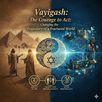A GENERATION WITH A HUGE SENSE OF ENTITLEMENT
- Rabbi Yosef Vogel

- Mar 23, 2018
- 2 min read

Human beings crave for balance in their lives. Societies are healthy and sustainable only when it’s components are in their correct proportions. Imbalances can cause stress and are sometimes cause for great concern.
We are all aware of many great imbalances in our world today which are even more accentuated as a result of the digital and social media age in which we live. There is one imbalance which I feel should be one of greatest causes for concern.
I’m referring to the imbalance between gratitude and appreciation on the one hand and a sense of entitlement on the other hand.
We live in a world where the starting position of many young people is that what they have is theirs and they deserve to have more. Most of us are preoccupied primarily with what we do not already have, focusing very little time on thinking about and appreciating what we already do have.
A wise man once said “it’s not what we have that makes us happy, it’s how much we appreciate what we have that makes us happy”. Very simple but very true.
In this week’s Torah Portion we read about a sacrifice called “thanksgiving”. Unlike others it was not an obligation to bring. It was only offered when one felt like saying thank you to G-d for “miracles” which one had experienced. And as we say in our prayers three times a day “for your miracles which are with us daily”.
The mystics explain that it is this “thanksgiving” sacrifice which will be the only individual offering brought on the alter in messianic times. For in those days we will not have to ask G-d for anything, for mankind will be lacking nothing. And therefore prayer will consist only of saying “thank you” to G-d for everything we have.
The Lubavitcher Rebbe brings this point home by suggesting the following: That in order to usher in those messianic times we should all begin to behave as if those days were already upon us.
We can do this by redressing the imbalance of “gratitude” vs. “entitlement”, by asking ourselves the following question:
How much time do I spend on thinking about the things I do not have?
And how much time do I spend on appreciating and saying thank you for the things I do have?






Comments